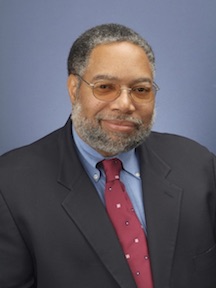By Braden Turner
At the 2018 Triennial Council, the Phi Beta Kappa Society will honor Lonnie G. Bunch III with the Distinguished Service to the Humanities Award for his significant, lifelong contributions to the field of history. His achievements include service on the Committee for the Preservation of the White House during the George W. Bush and Barack Obama administrations, as well as his work as the founding Director of the Smithsonian Institution’s National Museum of African American History and Culture from 2005 to the present day. The award, given every three years, was established in 1970 by a gift of $25,000 to the Society from Mr. and Mrs. William B. Jaffe. It includes a cash prize and a medal named for the Jaffes.
Bunch first became interested in history as a way to contextualize the struggles of growing up as an African American man in a predominantly Italian community. “There were people that treated me wonderfully and people that hurt me, and I wanted to understand why,” he explains. “And so, initially, reading history was my way of… trying to understand my life better, but it also allowed me to understand the country better.” Bunch’s interest in history followed him from childhood into his professional life, eventually earning him a B.A. (1974) and M.A. (1976) from American University.
He subsequently taught for several years as a university professor before shifting to curatorial work at museums. In 1983, Bunch became the first Curator of the California African American Museum. He then moved to the National Museum of American History in 1989, where he advanced to the position of Associate Director. His hard work at the National Museum led to an offer to become President of the Chicago Historical Society, where he served from 2001 to 2005. While in Chicago, Bunch prioritized community outreach and successfully led a significant fundraising campaign for the institution. In 2005, he received the offer to serve as the first Director of the National Museum of African American History in Washington, D.C., the post he still holds today.
When asked about the accomplishments and contributions that brought him to the directorial position in D.C., Bunch humbly suggests that “dumb luck” is to thank for his success. But it is clear that Bunch has created his own luck through the energy and passion he’s brought to the field of history over the years. He adds, “I think in many ways, taking on this job, the rest of my career prepared me for [it].” And while he cites wrestling with history as a college professor and preparing exhibits for museums as instrumental experiences for his current position, above all else, he credits “a love of history” and a “desire of sharing that passion with as broad an audience as possible” for his high achievements.
Given this response, it comes as no surprise that Bunch champions the humanities. In response to universities scaling back or eliminating their courses of study in this academic area, Bunch says, “Without history and the humanities, it’s like going into a boxing match with one hand tied behind your back. The inability to understand, to contextualize, to think in critical ways, to be nimble—all the things that we talk about that are crucial for the 21st century employee—where do you get that from outside the humanities?” In addition to stressing the benefits a liberal education can provide to individuals, Bunch suggests that society as a whole can better prepare for the future by examining the past. “History,” he says, “is really as much about today and tomorrow as it is about yesterday.”
Bunch extends this line of thinking into his work at the National Museum of African American history. “The museum’s vision is a vision that shapes not just the past but the future,” says Bunch. Part of that role in shaping the future involves actively taking part in and mediating the national conversation. According to him, the museum should be considered a “pilgrimage spot, a safe space where people of different points of view can grapple with issues of race, issues of inclusion, things that divide us.” He sees the museum as “a place that celebrates conversations, that allows us to come together as a nation and not simply be divided.”
Perhaps most importantly, the museum itself stands as a strong testament to the importance of African Americans in the history of the United States. Bunch sees the museum “as firmly setting out the notion that African American culture in many ways is the quintessential American culture. That this is not a story by African Americans for African Americans, but rather it is the story that has profoundly shaped us all. And I think that notion will be what I will continue to push, and what I hope the museum will do long after I’m gone.”
In regards to winning the Award for Distinguished Service to the Humanities, Bunch says he is “unbelievably honored and humbled… there’s a part of me that is honored that what this award is saying is that it’s less about me and more about the power of history, and the importance of remembering, and the importance of centralizing African American history and culture. So, I’m really humbled at that recognition.” Citing Phi Beta Kappa’s commitment to academic excellence and to the humanities, Bunch praises the Society as “a really important organization that is helping make the country better even if the country doesn’t realize it.”
Bunch will be honored at the Triennial Council Meeting of the Phi Beta Kappa Society in Boston on August 4, 2018.
Braden Turner is a senior at The University of Tulsa majoring in English and minoring in history and economics. He became a member of Phi Beta Kappa in 2017, during his junior year. The University of Tulsa is home to the Beta of Oklahoma Chapter of Phi Beta Kappa.
Photo credit: Smithsonian Institution




